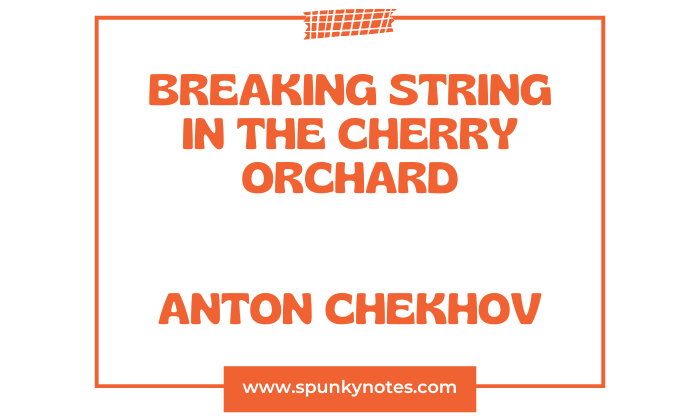
Q. Discuss the significance of the breaking string sound that appears in the play The Cherry Orchard by Anton Chekhov. What does it symbolize?
Introduction to Chekhov’s Symbolism
Anton Chekhov’s play “The Cherry Orchard” is a poignant examination of a changing Russian society at the turn of the 20th century. A tale of societal transition, it captures an aristocratic Russian family’s struggle with significant economic hardships, threatening the loss of their beloved cherry orchard.
Anton Chekhov’s “The Cherry Orchard” is more than just a portrayal of a changing Russian society—it’s a masterclass using symbolism to enrich the narrative and deepen understanding.
Among the many symbolic references in the play, the recurring sound of a breaking string is particularly intriguing.
This mysterious sound, occurring twice without a visible source or explicit explanation, permeates the play’s fabric. It provides the audience with an auditory symbol that creates a sense of intrigue and invites varied interpretations.
The String as a Metaphor for Lost Connections
One could argue that the sound of the breaking string symbolizes the breaking or severing of ties. Just as a string connects two points, the characters in the play are connected to their past, to their beloved cherry orchard, and to the traditional Russia that’s rapidly undergoing modernization.
The “string” linking them to old traditions is breaking, showing their changing situation. Chekhov uses this sound to show unavoidable changes in early 20th-century Russia. Characters like Madame Ranevskaya and Gaev find it hard to accept these changes.
The Sound of Melancholy
The sound of the breaking string is described as mournful and sad, which ties in beautifully with the theme of sorrow that Chekhov weaves throughout the play.
The characters—most prominently Madame Ranevskaya and her family—are struggling with the impending loss of their estate, social status, and comfortable way of life.
The breaking string could be seen as an auditory manifestation of their shared sorrow. It’s as if their collective grief, their internal tumult, has found an echo in the outside world through this mysterious sound.
A Harbinger of Change
The sudden, unexpected noise of the breaking string is also a sign of disruption and change. It is a reminder that the tranquility and status quo have been disrupted. In the context of the play, this disruption is the societal shift upending the characters’ lives.
It’s a call to attention, a wake-up call to the characters that their old way of life, symbolized by the cherry orchard, is no longer sustainable.
Characters’ Reactions to the Sound
The characters’ reactions to the sound of the breaking string reveal much about their feelings toward the changes they’re experiencing. When the sound is heard, Madame Ranevskaya responds with strangeness.
LUBOV. What’s that?
LOPAKHIN. I don’t know. It may be a bucket fallen down a well somewhere. But it’s some way off.
GAEV. Or perhaps it’s some bird … like a heron.
TROFIMOV. Or an owl.
LUBOV. [Shudders] It’s unpleasant, somehow.
The unknown and potentially unsettling sound symbolizes the uncertainty and fear they feel in the face of change. The guesses of each character regarding the source of the sound may also reflect their perspectives and reactions to the societal shifts occurring around them.
LUBOV’s reaction demonstrates her discomfort and fear, mirroring her struggle with the reality of selling her cherished cherry orchard due to financial problems.
LOPAKHIN’s pragmatic guess might reflect his businesslike worldview as a businessman who ultimately purchases the cherry orchard.
The guesses of GAEV and TROFIMOV might illustrate their respective viewpoints – GAEV as a nostalgic aristocrat holding onto a disappearing past and TROFIMOV as an intellectual who welcomes future possibilities.
It shows their awareness and disturbed reaction to this unexpected disruption. These responses highlight their discomfort and resistance to the impending changes—a struggle to acknowledge and accept their new reality, which lacks the security and prestige of their old life.
Chekhov’s Mastery
Chekhov’s use of this auditory symbol—a sound the audience hears but does not see a source for—shows his skill and innovativeness as a playwright.
Chekhov uses an auditory symbol to involve the audience in the same sense of discomfort and unease the characters feel.
The sound of the breaking string, heard but not understood, mirrors the characters’ feelings of disquiet and fear towards the unknown changes occurring around them.
It enhances the emotional depth of the play, creating a resonance between the audience’s experience and the character’s emotional journey.
The Sound in Context
In Act Two, while the characters are conversing about the cherry orchard, the sound of the breaking string suddenly emerges. It interrupts their chatter and instills a sense of unease.
Madame Ranevskaya, perplexed, asks, “What was that?” Unfortunately, no one can answer. It reflects the characters’ shared uncertainty and confusion.
In Act Three, during a ball filled with desperation and denial, the sound of the breaking string resurfaces. Amidst the chaos of the party, the string snaps once again.
It serves as a poignant reminder of the harsh reality awaiting them—the impending loss of their beloved estate.
A Tool for Audience Engagement
The sound of the breaking string also serves a dramatic function. It creates suspense and intrigue for the audience, a pause in the narrative flow that heightens attention.
The sound’s origin and meaning captivate the audience, mirroring the characters’ curiosity and immersing them further into the narrative.
Conclusion
In conclusion, the breaking string sound in “The Cherry Orchard” symbolizes change, loss, and the characters’ inner turmoil. It ties together the play’s central themes.
It reflects the societal shifts in early 20th-century Russia and the personal loss experienced by Madame Ranevskaya and her family.
Anton Chekhov uses this auditory symbol to deepen the audience’s understanding and engagement. It creates a shared experience of uncertainty, disquiet, and anticipation.
Even after the final curtain call, the echo of the breaking string continues to resonate. It symbolizes the enduring impact of change and loss.
The breaking string represents the simultaneous destruction and transformation of the characters’ lives, blurring the boundaries between laughter and tears.

